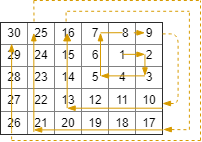On a 2 dimensional grid with
R rows and C columns, we start at (r0, c0)facing east.
Here, the north-west corner of the grid is at the first row and column, and the south-east corner of the grid is at the last row and column.
Now, we walk in a clockwise spiral shape to visit every position in this grid.
Whenever we would move outside the boundary of the grid, we continue our walk outside the grid (but may return to the grid boundary later.)
Eventually, we reach all
R * C spaces of the grid.
Return a list of coordinates representing the positions of the grid in the order they were visited.
Example 1:
Input: R = 1, C = 4, r0 = 0, c0 = 0 Output: [[0,0],[0,1],[0,2],[0,3]]
Example 2:
Input: R = 5, C = 6, r0 = 1, c0 = 4 Output: [[1,4],[1,5],[2,5],[2,4],[2,3],[1,3],[0,3],[0,4],[0,5],[3,5],[3,4],[3,3],[3,2],[2,2],[1,2],[0,2],[4,5],[4,4],[4,3],[4,2],[4,1],[3,1],[2,1],[1,1],[0,1],[4,0],[3,0],[2,0],[1,0],[0,0]]
Note:
1 <= R <= 1001 <= C <= 1000 <= r0 < R0 <= c0 < C
這題用沒有向量的C不是很容易解,只好用暴力的方式求解,利用的方法很單純,就是讓 (r0, c0) 去繞圈圈,而且根據旋轉的特性,可以發現右下左上這樣的順序,格數變量是 1,1,2,2,3,3,4,4....,所以程式就長成下面這樣。leetcode 報 20ms,目前百分位置是 100%,期待出現更快的解法可以參考。
/** * Return an array of arrays of size *returnSize. * The sizes of the arrays are returned as *columnSizes array. * Note: Both returned array and *columnSizes array must be malloced, assume caller calls free(). */ int** spiralMatrixIII(int R, int C, int r0, int c0, int** columnSizes, int* returnSize) { int **ret; int i, j; int step; *returnSize = R * C; columnSizes[0] = (int *) malloc (R * C * sizeof(int)); ret = (int **) malloc (R * C * sizeof(int *)); i = 0; ret[i] = (int *) malloc (2 * sizeof(int)); ret[i][0] = r0; ret[i][1] = c0; columnSizes[0][i] = 2; ++i; if (i == *returnSize) { return ret; } step = 1; while(1) { if (r0 >=0 && r0 < R) { for (j=1; j<=step; j++) { ++c0;
if (c0 >= 0 && c0 < C) {
ret[i] = (int *) malloc (2 * sizeof(int));
ret[i][0] = r0;
ret[i][1] = c0;
columnSizes[0][i] = 2;
++i;
if (i == *returnSize) {
return ret;
}
}
}
} else {
c0 += step;
}
if (c0 >= 0 && c0 < C) {
for (j=1; j<=step; j++) {
++r0;
if (r0 >=0 && r0 < R) {
ret[i] = (int *) malloc (2 * sizeof(int));
ret[i][0] = r0;
ret[i][1] = c0;
columnSizes[0][i] = 2;
++i;
if (i == *returnSize) {
return ret;
}
}
}
} else {
r0 += step;
}
++step;
if (r0 >= 0 && r0 < R) {
for (j=1; j<=step; j++) {
--c0;
if (c0 >= 0 && c0 < C) {
ret[i] = (int *) malloc (2 * sizeof(int));
ret[i][0] = r0;
ret[i][1] = c0;
columnSizes[0][i] = 2;
++i;
if (i == *returnSize) {
return ret;
}
}
}
} else {
c0 -= step;
}
if (c0 >= 0 && c0 < C) {
for (j=1; j<=step; j++) {
--r0;
if (r0 >=0 && r0 < R) {
ret[i] = (int *) malloc (2 * sizeof(int));
ret[i][0] = r0;
ret[i][1] = c0;
columnSizes[0][i] = 2;
++i;
if (i == *returnSize) {
return ret;
}
}
}
} else {
r0 -= step;
}
++step;
} return ret; }
沒有留言:
張貼留言